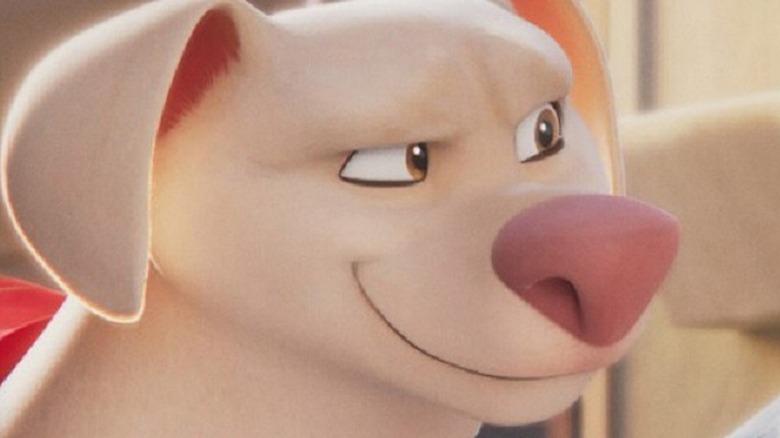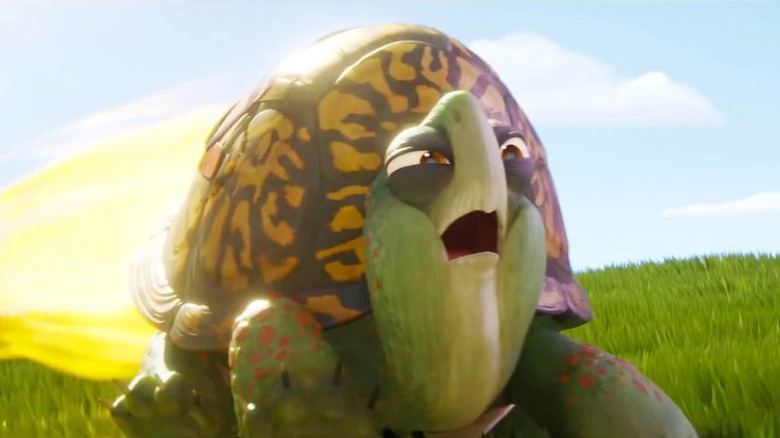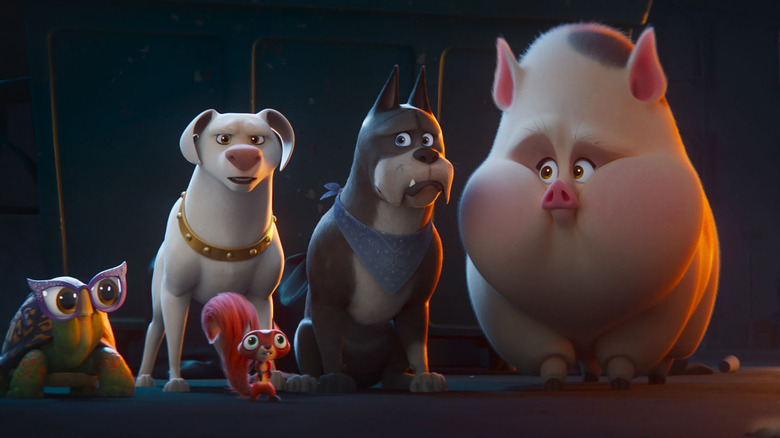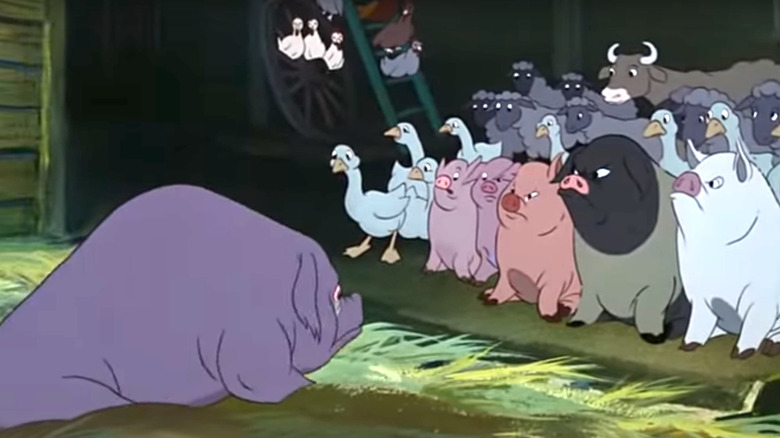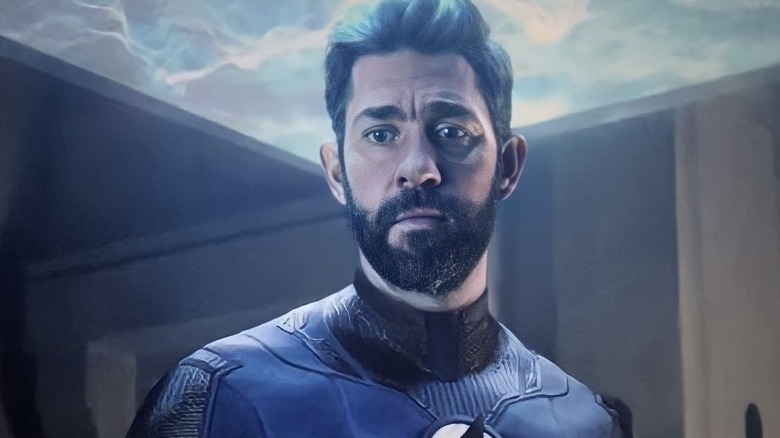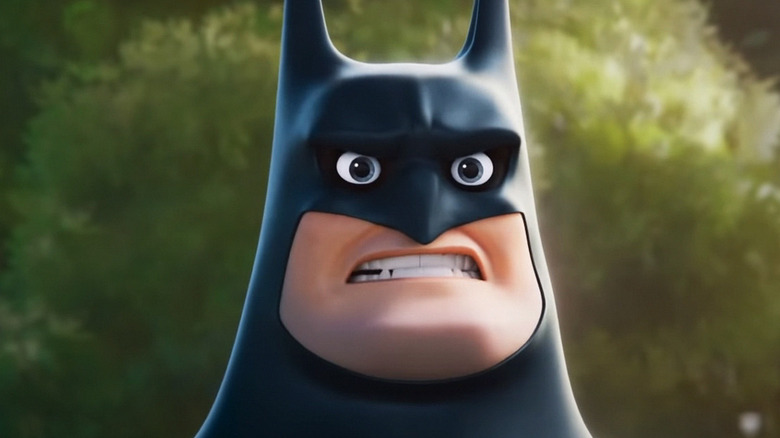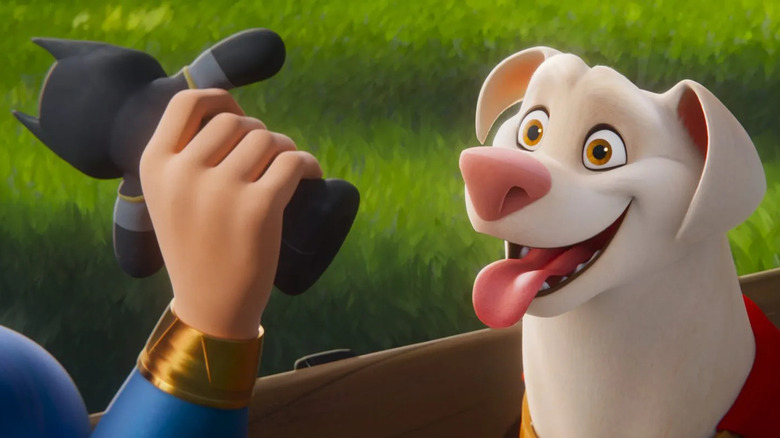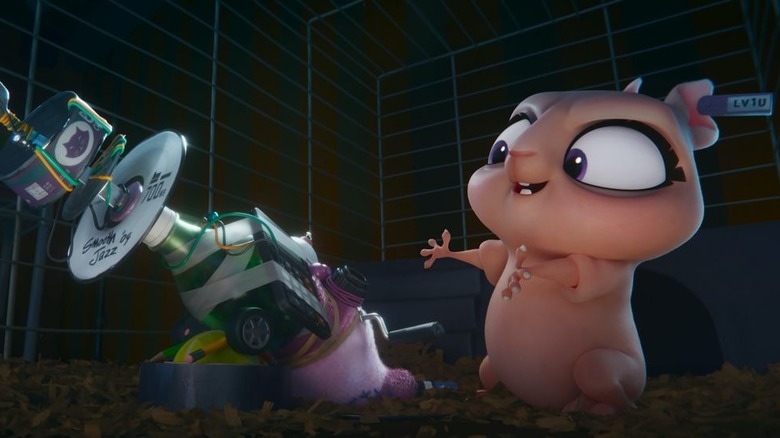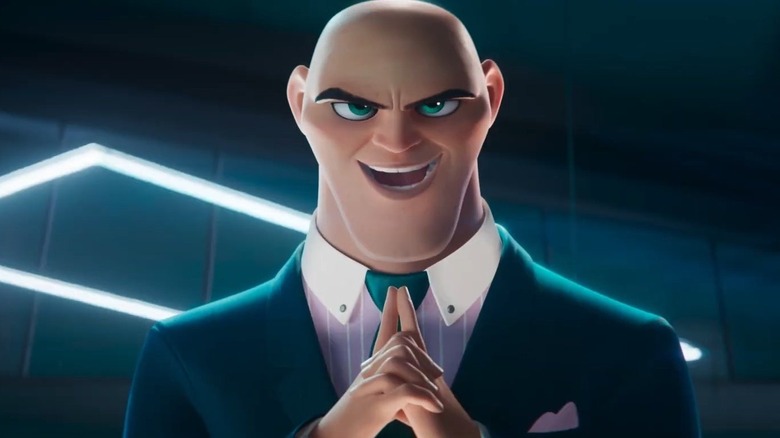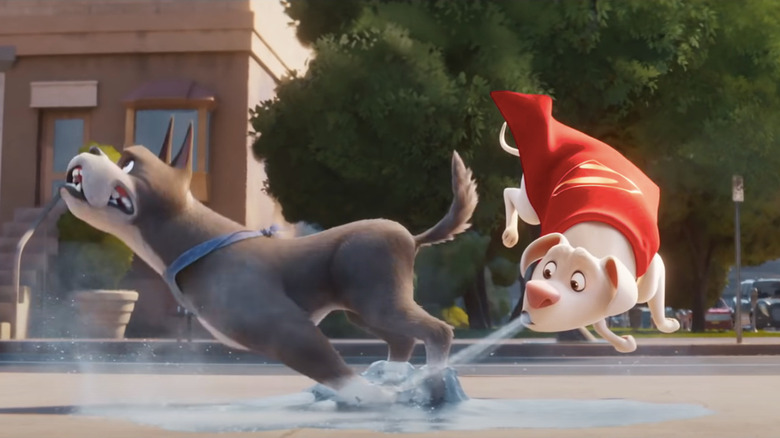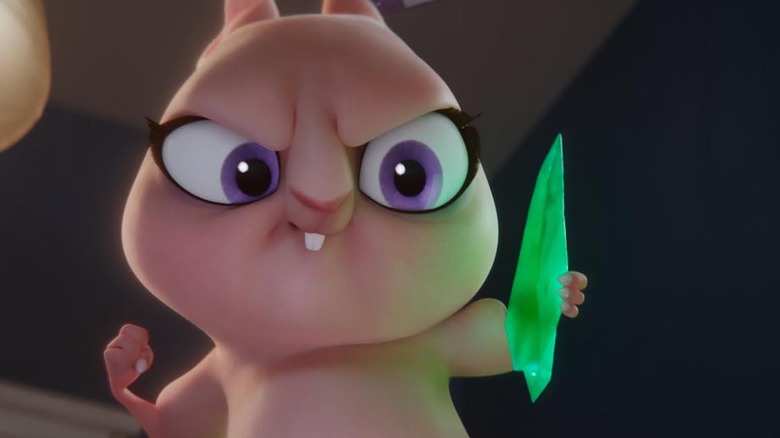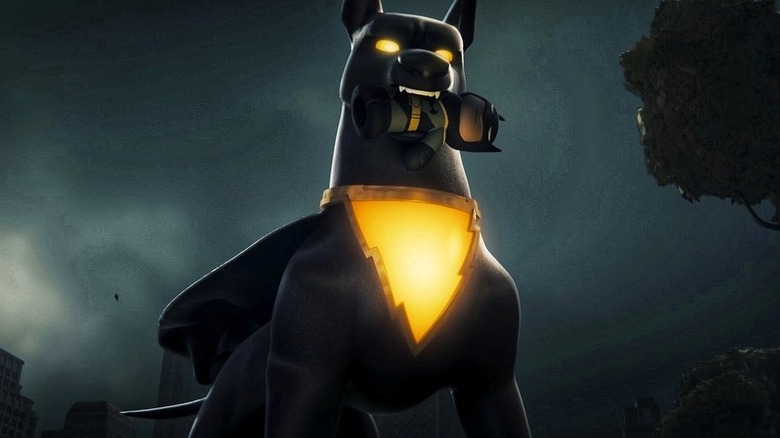Things Only Adults Notice In DC League Of Super Pets
Contains spoilers for "DC League of Super-Pets."
Holy surprising spin-offs, Batman, "DC League of Super-Pets" is out and it's pretty darn good. For all the missteps DC has made trying to build up the DCEU, they tend to knock it out of the park when they take chances with tonal oddballs like "Shazam!" and "Birds of Prey" — and "DC League of Super-Pets" is no exception. It's a fun adventure the whole way through, and is worth a watch, even for adults. Though primarily a kids' movie, it is chock full of toilet humor, explosions, and cute, cuddly creatures — it also has a lot of secret references and jokes that only adults will notice.
The movie does an excellent job keeping the adult stuff hidden where only the adults can find it, but any adults looking will find a treasure trove. "DC League of Super-Pets" can barely go five minutes without making fun of DC and Marvel movies alike, mixing in a risqué innuendo, or even trying its hand at real-world commentary. While the kids are busy laughing at the super-powered guinea pigs, parents get their own chuckles in the form of frisky turtles and John Krasinski jokes. For those and more, here are things only adults notice in "DC League of Super-Pets."
Everything about Merton
Surprisingly, a huge chunk of the adults-only moments in "DC League of Super-Pets" come from a single source, and even more surprisingly, that source is an elderly, blind turtle named Merton. Voiced by the always-excellent Natasha Lyonne, Merton is a turtle who has evidently lived a long, full life and now only cares about life's simple pleasures. As adults will quickly notice, Merton's definition of simple pleasure is mainly eating, swearing, and — to put it politely — making the beast with two shells.
Merton's salty language gets her bleeped multiple times throughout the movie, and even when she's not bleeped, her dialogue is more adults-only than anyone else's in the movie — for example when she warns Superman and Lois Lane to get a prenup before they tie the knot. Har har.
More than anything else, however, Merton's constant lust is her biggest contribution to the movie's adult moments. She puts the move on a construction worker's helmet and a Garfield toy because her near-blindness makes anything vaguely turtle-sized or turtle-shaped a potential hookup. One line in particular that will go over kids' heads is when Merton tells the other pets "you never forget your first."
The farm upstate
When we first meet all of the non-Krypto pets, they're stuck in an animal shelter. Though they're treated well, they're forced to watch cute kitten after cute kitten find a home almost instantly while they sit in their cages, day in and day out. In response, de facto leader Ace keeps their hopes alive by telling them about a mythical paradise that they'll all escape to one day. It's a place where animals of all kinds are free to live out their days peacefully, with no owners needed. The only problem is that Ace calls it "the farm upstate," and as most parents will know: that mythical farm is not where animals go to live, but rather the opposite.
It's a common lie parents tell their children when they lose their pets: "Don't worry, sweetie, they just went to live on a farm upstate." The farm myth is meant to reassure grieving children and protect them from the cold, hard truth: their pets either ran away, died, or perhaps worst of all, were put down by their parents. For adults who know the truth about the farm upstate, the pets' determination to go there together is less of a dream and more of a nightmare.
Animal Farm
Although the shelter pets seem blissfully unaware of what the phrase "the farm upstate" truly means, they do show a momentary realization of how dark that farm could actually be. When Ace describes the farm to the other pets, he mentions that there are no humans on the farm and that it's run entirely by pets – what they call an "animal farm." Hearing that title, Vanessa Bayer's meta-aware pig PB responds, "That doesn't sound ominous at all."
Most children seeing "DC League of Super-Pets" won't yet be familiar with the works of George Orwell or Joseph Stalin's brutal rise to power, so the reference will go right over their heads. But adults will know that the animal farm in question is actually "Animal Farm," Orwell's masterpiece satire about the Russian Revolution.
For those who haven't read it, the book uses animals as stand-ins for real, historical figures like Stalin, Vladimir Lenin, and Leon Trotsky, and the farm as a stand-in for 1910s Russia. The book's plot is notoriously bleak and depressing, resulting in the deaths of almost every main animal. On top of that, the perpetrators of all of this violence are pigs — just like PB.
Digs at Marvel
Unsurprisingly, "DC League of Super-Pets" takes a few opportunities to poke playful fun at the competition – and the biggest competition of them all is Marvel. The movie isn't spiteful or mean at all, and makes jokes out of practically everyone and everything it can, but for any superhero movie, that means a lot of chances to burn other superheroes. "DC League of Super-Pets" doesn't waste those chances.
Some of the Marvel references are just that — they simply refer to a hero without ribbing them. A good example is when PB describes getting her powers as "My origin story, and my uncle didn't even have to die!" — an obvious shout-out to Spider-Man and the death of his uncle Ben. Another one of the lighter examples is when Superman, played by Krasinski, bemoans his Kryptonian heritage, saying "Why couldn't I have been stretchy or gotten a magic hammer or something?" Not only is this a clear reference to Marvel heroes Mr. Fantastic and Thor, but Krasinski's last outing as a superhero was in "Doctor Strange in the Multiverse of Madness" when he played Mr. Fantastic.
Other jokes are more cutting, like when Superman jokes that "They should call be Iron Man" before chuckling and disdainfully saying "No" or when Lex Luthor begs to be granted any super-powers at all, even "the ability to throw playing cards really hard." That could very well be a dig at Gambit, Bullseye, or both.
Digs at D.C.
A truly equal-opportunity joke machine, "DC League of Super-Pets" makes fun of a whole heap of DC heroes, including nearly every hero in the movie. As the lead person and animal, Superman and Krypto get some of the worst of it. Both of their secret identities — Clark Kent and Bark Kent, respectively — are lambasted for their flimsiness, including their useless glasses which they're told "aren't fooling anyone." Their hometown is even ridiculed when Krypto insists that the farm upstate sounds made-up and tells them he knows a real farm in Smallville, the pets respond with "Smallville? Now that sounds made-up."
Aquaman is also roasted, for example when he complains about being trapped in a fish tank but then greedily gobbles up fish food like a common goldfish. The DC multiverse itself becomes the butt of a joke when Lois calls the Justice League Crisis Hotline, only to be met with an automated voice that says "For Earth-1, press one. For Earth-2, press two" and shows no sign of stopping. Perhaps the one DC property that gets it worst is Batman, whose every moment in the film is used for comedy. At one point, he repeats one of his mantras about how he works alone but adds "except for Robin. And Alfred." The movie cuts away and when it cuts back, he's still going, adding "My I.T. crew. Whoever Morgan Freeman played..."
Pets should not exist
Most of the things that only adults notice in "DC League of Super-Pets" are put there intentionally. They're mostly jokes and references meant to make adults laugh while their kids laugh at the more juvenile humor. Some things only adults notice, however, are completely unintentional, like in the case of the film's central premise and how wildly dark it is.
As you'd expect, the movie's cast is split between humans (and Atlanteans, Kryptonians, etc.) and animals, with the animals all kept as pets, owned by the humans. The problem with that setup is that the movie makes it clear that all pets are as intelligent as humans and what's worse — the humans all know it. Superman shows no surprise as he watches Krypto operate a microwave, and Luthor doesn't even blink when he finds out that one of his guinea pigs built a tracking beam. That makes the fact that humans keep all of their animals in cages with little to no enrichment a bit unsettling.
What's worse is that all the animals clearly understand English and at one point — after Lulu gives an evil speech — the movie strongly implies that Batman understands her language. To know animals are as intelligent as humans and understand their language but still imprison them makes this an unusually dark world.
A bit of interspecies love
Don't worry: No animal and human share a romantic or sexual relationship in "DC League of Super-Pets" — but it's not for one animal's lack of trying. The movie's main antagonist, the genetically-engineered and super-powered guinea pig Lulu, spends the whole movie trying to kill the Justice League, which is about as typical of a villain plot as can be. What is less typical, however, is her motivation: She only wants to kill them to impress her former owner, Lex Luther, so he'll fall in love with her.
The movie puts a lot of effort into never explicitly stating Lulu's love, but it also leaves in more than enough hints to make it obvious, at least to adults. For one thing, Lulu is always referring to how "handsome" Luthor is, mentioning parts of him she loves like his "nice hands." For another, Lulu often mentions her desire to convince Luthor to their lives together.
One of the weirdest moments between Lulu and Luthor is when she breaks Luthor out of jail on Stryker's Island. When Luthor steps out of his cell, he holds hands with Lulu and they twirl. As they spin together, staring deeply into each other's eyes, romantic music swells and there is no doubt at all that the moment is just a little too close to interspecies love.
Calling out billionaires
In addition to fictional characters like Marvel and DC heroes, "DC League of Super-Pets" is not above sneaking in jokes at the expense of real-world figures, too. One of its biggest targets is a particular social stratum — probably the only one that is acceptable to lampoon — the ultra-rich. Of course, since Batman is such a frequent target, his insane wealth comes under fire, but so does the wealth of billionaires in general.
Early in the movie, when Luthor is sent to prison by the Justice League, footage of his arrest is shown on a TV news channel. Underneath his scowling face is a scrolling chyron that reads "wealthy person actually goes to jail." This is of course a joke that only adults will understand, as it references the ability of the real-world rich and famous to use their money to seemingly live above the law.
Another major shot at the rich is when Luthor tells the Justice League that he has his own private rocket ship hidden in his office. In response to their incredulity, he responds that "all billionaires have them." Batman, himself a billionaire as well, adds, "It's true." As only adults would notice, this dialogue is a reference to the so-called "billionaire space race" that has recently raised controversy.
Powers come and go
One aspect that is common to almost every kids' movie, but which only adults will notice, is the movies' tendency to forget plot points, rush others, and just generally do whatever it takes to get our heroes to the story's end. There are a ton of animated movies that do this, though most kids are too inexperienced and engrossed to notice, and "DC League of Super-Pets" is no exception. The most flagrant example in the movie is how it frequently turns its characters' superpowers on and off whenever it's convenient for the writers. Though kids won't notice, many adults will, prompting a lot of playful skepticism directed at their screens.
Almost every superpower in the movie comes and goes at the writers' whims, but the easiest to spot — and the one that affects the plot the most — is Krypto's enhanced senses like super-hearing and X-ray vision. Krypto's super-hearing picks up Superman's cries for help but doesn't hear anything Clark says to the animal shelter employee or Lois in the park. His X-ray vision then catches Superman talking to that same employee but fails to notice, well, anything happening in any other location ever. It's a tough pill to swallow demonstrating that our hero can see and hear almost anything in the city and then asking us to accept that he never has any idea where the villain is, or the kidnapped Justice League members, or anything else, for that matter.
Deus ex manure-a
While we're on the subject of story issues that only adults notice when it comes to the film, it has to be mentioned that the single biggest plot issue in the entire movie is all due to one of Krypto's poops.
One of the movie's biggest character arcs in the movie is Krypto learning to be a hero without needing powers, and so the ending of "DC League of Super-Pets" should have reflected that. Krypto does indeed learn to accept his lack of powers and also tries to be a hero without them, but it just causes him to fail. All that growth gets him is time in a prison cell, his friends are stuck in prison as well, all of them defeated and depressed. But then, Krypto happens to take the luckiest poop in history and passes the Kryptonite shard that had been stuck in his gut, regains his powers, and saves the day.
Krypto doesn't save the day because he learned to be a hero without powers — he saves the day specifically using his powers. What's more, he actually taps into an entirely new power, the "Solar Paw Punch" to defeat the villain and save the city. His entire arc over the whole movie went nowhere, and instead, he wins because he dropped a perfectly-timed deuce.
Seven Bucks Productions
It's easy to point out jokes that are too dirty or too topical for kids to notice, or story weaknesses that go over children's heads, but one of the rarer aspects of movies that make the experience different for kids and adults is the behind-the-scenes action. To kids, Krypto is just Krypto and that's it. To adults, Krypto is voiced by Dwayne "The Rock" Johnson, and seeing that Johnson's personal production company, Seven Bucks Productions, financed the movie, changes a few pieces of it.
Right before the movie starts, the logo for Seven Bucks Productions takes over the screen, and that changes a few things for many adults. Now, knowing that Johnson helped finance the film and guide it creatively, some of the film's choices make more sense. It makes more sense that Johnson plays the lead role (though it could be unrelated). It makes more sense that Johnson's go-to co-star, Kevin Hart, plays the other lead opposite Johnson. And it definitely makes more sense that the movie's end-credits scene – which Johnson created — is basically just a teaser for his next superhero movie, the upcoming DCEU film "Black Adam."
